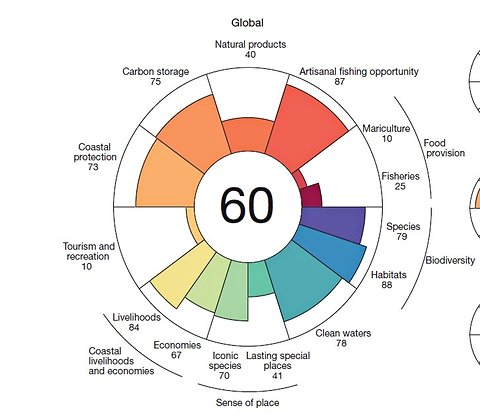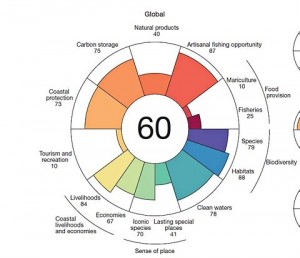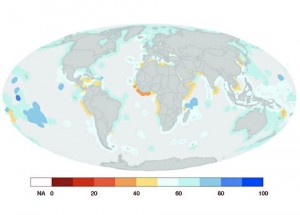
24 Aug EARTH MATTERS: OCEAN HEALTH UP TO US
How decisions we make about the coasts and oceans affect overall ocean health
A paper published [today] in Nature outlines a way to assess and compare the health of ocean ecosystems across different countries. The study uses a series of indicators to measure 10 public goals: food provision, artisanal fishing opportunity, natural products, carbon storage, coastal protection, tourism and recreation, coastal livelihoods and economies, sense of place, clean waters, and biodiversity. It looks at the current status and likely future scenario for each goal in order to include sustainability in the equation.
The index can be used at a range of scales, but here the researchers looked at global scale, where the overall health of the ocean received a score of 60, as well as at the exclusive economic zone (EEZ) scale, allowing them to compare different countries.
The United States is in the middle of the pack with a score of 63. Obviously, that leaves lots of room for improvement, as the paper notes. On the other hand, it also means that there are several things that the US is doing well. In fact, the paper calls out the U.S. National Ocean Policy for focusing on “…using comprehensive ecosystem-based management to address the needs of both humans and nature.”
One of the benefits of the index is that local priorities can be considered when weighting different goals. The researchers started with the goals weighted equally, but then also ran four different value sets, which they labeled “preservationist,” “non-extractive,” “extractive” and “strongly extractive.” The global scores changed depending on the values selected, from 67 points from the preservationist perspective to 56 from the strongly extractive perspective.
The index is a starting point only. Some data gaps exist: for instance, there was little information to include in the tourism and recreation goal, which led to artificially low scores. The index will improve as those get filled. Like any index, too, it does not look at every indicator that may be important to a community. Nevertheless, it is a good starting point for discussion and for showing how different ocean and coastal issues fit together in a larger management context and how the decisions we make matter across a range of issue for overall ocean health. 
As we move forward with the National Ocean Policy, we can use this information to help make better decisions for the health of our coasts, ocean, and communities. Working together, we can move to the head of the class.



Sorry, the comment form is closed at this time.